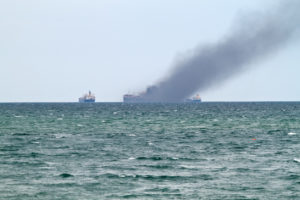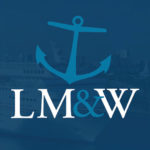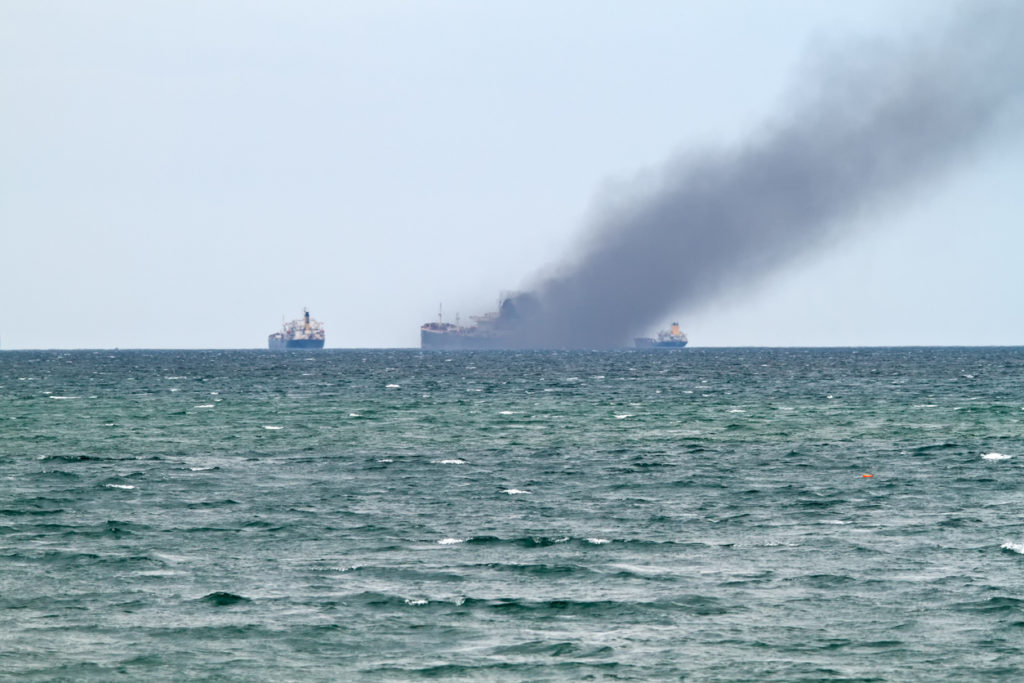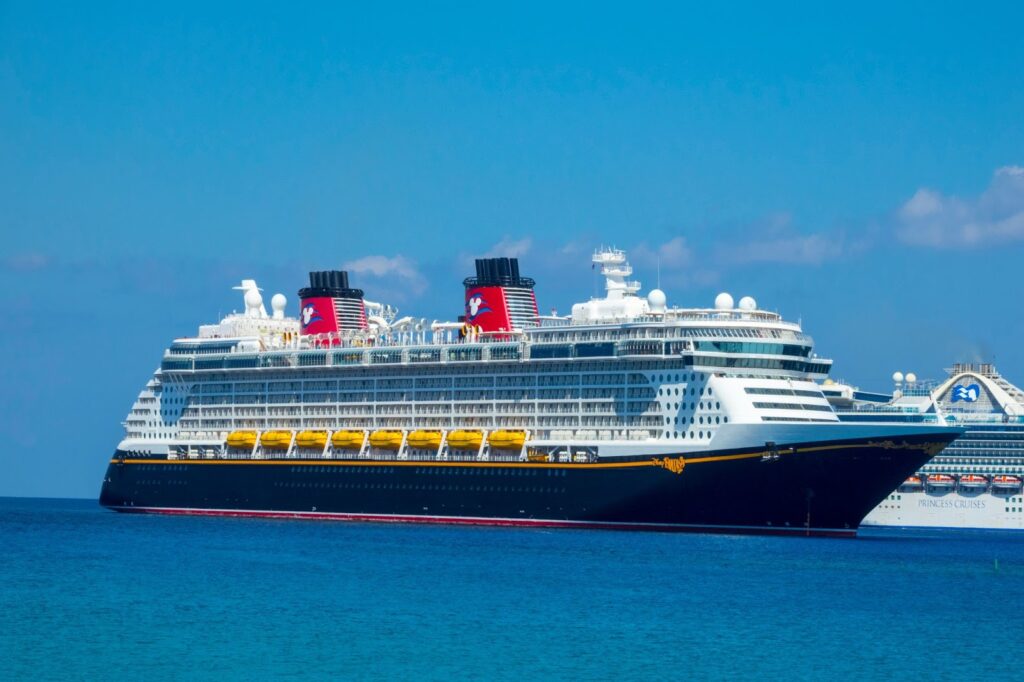
When a cruise ship engine fire or other fire on a cruise ship occurs, it becomes important for passengers to know how to react in the aftermath. This means understanding how to respond to the incident when it occurs, and what to do afterwards if the fire caused a victim to suffer harm.
Lipcon, Margulies & Winkleman, P.A. is here to help. Our legal team has provided representation to injured victims after many recent cruise ship fires. We have successfully held cruise lines accountable for negligence that put lives at risk and we know how to overcome the challenges associated with gathering evidence related to fires that happen at sea.
If you or a loved one has been harmed by a cruise ship or any other incident on a cruise line, you should give us a call as soon as possible to get the assistance you need.
Passengers are at Risk in a Cruise Ship Fire
Cruise ships are self-contained cities in-and-of-themselves, which makes the situation very dangerous when a fire breaks out at sea. Passengers may have limited options to escape from a fire and loading hundreds or thousands of passengers onto lifeboats to leave a ship is impractical when a fire breaks out.
Passengers are at risk of burn injuries and injuries from smoke inhalation when a fire starts aboard a ship. Unfortunately, the risk to passengers also continues when the fire is put out. Fires often knock out the electric on ships, and it may not be repairable. This can lead to passengers floating at sea with a ship that’s limited in its ability to transport them to safety, with no power and lacking in basic necessities.
Most Recent Cruise Ship Fires – Carnival Cruise Ship
Perhaps the most famous recent example of this was a recent fire on a Carnival cruise ship, the Carnival Triumph, which left passengers stranded for days on a “cruise from hell,” living in “tent cities” in open spaces on the cruise ship when inhabiting their rooms became impossible and as the scent of sewage made passengers ill.
Lipcon, Margulies & Winkleman, P.A. has filed a class action in response to this Carnival Triumph incident, taking on Carnival on behalf of passengers to ensure the cruise line is held accountable for what it put passengers through.
While the Carnival Triumph incident captured the attention on the news and made headlines, it was far from the only incident involving a fire on a cruise that put passenger safety in jeopardy. Far too often, these incidents get little attention and affect only those passengers aboard the ship who are left sick, injured, or worse.
How Common are Cruise Ship Fires
Unfortunately, cruise ship fires are far more common than many passengers would like to believe. In fact, CNN reported on numerous cruise ship fires in recent years, indicating that The U.S. National Transportation Safety Board warned: “Hazardous situations that may result from a ship losing propulsive power include vessel grounding, inability to avoid severe weather conditions, and passenger evacuation at sea.”
A quick glance at the headlines shows a long list of recent cruise ship fires including the following:
- The famous fire on the Carnival Triumph that left 4,200 passengers standard at sea when the fire knocked out power to the ship and left it adrift. The air conditioning failed, there were few working toilets, passengers describe live sewage, and the ship sailed slowly along at four to eight miles per hour for days.
- A casino cruise ship near Port Richey, Florida started on fire with 50 passengers board. The incident left one person dead and 14 others injured.
- A Royal Caribbean cruise ship caught fire in Jamaica. The fire occurred in a mechanical area on the Freedom of the Seas cruise ship. Passengers were reportedly on board the ship at the time of the incident. Passengers were not injured but were sent to live boats because of the risk.
- A Royal Caribbean cruise ship caught fire in the Mediterranean, necessitating that 21 passengers be treated for smoke inhalation.
This is just a very brief list of many recent cruise ship fires.
Fires can happen on boats of all sizes, traveling anywhere in the world and under many different types of weather conditions. Some of the biggest and most well-respected cruise lines in the business have experienced engine issues, mechanical problems, or other issues leading to fires. Unfortunately, the consequences to passengers when this occurs can be devastating.
Cruise Lines Aren’t Doing Enough to Protect Passengers
Cruise lines have an obligation to ensure the safety of passengers, but most simply are not doing enough. As far back as the 1990s, the National Transportation Safety Board’s chairman at the time indicated that the cruise industry needed to improve both prevention and training in case of fires.
Since that time, dozens more fire have occurred as the cruise industry expanded and ships got larger. In many cases, the firefighting systems aboard these cruise ships are inadequate so putting out fires quickly becomes difficult or impossible, leaving passengers at risk of serious harm.
Compounding the problem, many modern cruise ships typically do not have backup generators on board that are powerful enough to provide the necessary power if a fire knocks out mechanical systems. It is this shortfall that can lead to the issues experienced after the fire on a Carnival Cruise ship left passengers stranded at sea for days, roasting in the heat and sick from the sewage that could not be processed.
Many passengers don’t realize that cruise lines aren’t adequately prepared for a fire or aren’t taking all the necessary precautions to prevent a fire from occurring. Unfortunately, forcing cruise ships to do the right thing can be difficult or impossible.
Cruise ships operate out of U.S. ports but many are not registered in the United States so there is a patchwork of applicable regulations, or no regulations at all, that apply to cruise ships to ensure they have taken adequate precautions to prevent fires and protect passengers in the aftermath.
The International Maritime Organization imposes more stringent fire regulations on some newer built ships, but many cruise lines have older ships in their fleet that aren’t even built to the modern minimum safety standards. Even the regulations that do exist are often not sufficiently comprehensive to ensure passengers aren’t put at continued risk of harm in the aftermath of a fire.
Cruise lines also rely on foreign countries to find workers who will work cheaply, and often fail to provide adequate training to staff members on fire response and protocols to improve safety for passengers.
Taking Action After a Cruise Ship Fire
Fires can happen for many reasons aboard a cruise ship, including engine damage, wiring problems, melted electrical cabling, problems with generators, or many other issues.
When fires occur aboard cruise ships, an investigation typically takes place. However, it is often the maritime authorities in countries where the cruise ship is registered – or “flagged” — that conduct investigations. This can make it difficult for cruise ship passengers to get answers about what happened, how a fire started, and whether the cruise line followed all safety precautions to keep them safe from harm.
Passengers who have been hurt by a fire, made sick by problems in the aftermath, or who have suffered injury as a result of smoke inhalation should have the right to pursue a claim against the cruise line responsible for harming them. Unfortunately, when they face challenges obtaining information about the fire, this can make claims against cruise lines more difficult.
Other legal issues arise as well when taking action against cruise ships, including choice of law and venue issues related to where a passenger can sue and what laws apply when they make their case.
Because of the complexities associated with pursuing legal action against a cruise ship after a fire, it is important that victims of a cruise ship fire have an experienced, knowledgeable attorney providing them with representation.
Lipcon, Margulies & Winkleman, P.A. has a long track record of providing representation to clients who have been harmed by a fire on a cruise ship or by other injuries aboard a cruise line. We have pursued cases against Carnival, Royal Caribbean, and other major cruise lines and we have the knowledge of international maritime laws necessary to ensure that cruise passengers who were harmed can obtain the necessary evidence to pursue a claim for compensation.
If you have been hurt in a fire or if a loved one was killed in a fire aboard a cruise ship, our dedicated and experienced legal team will work hard to make sure you can hold the cruise line accountable and get the money you need. To find out more about the assistance our cruise ship accident lawyers can offer you, contact us today.
Published on March 5, 2018
Categories: Cruise Ship Fires
Get Free
Consultation














